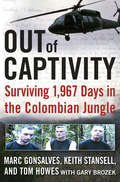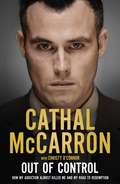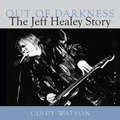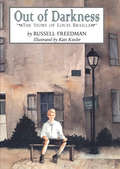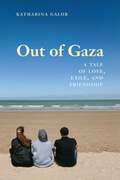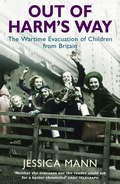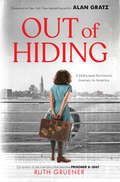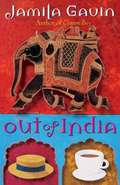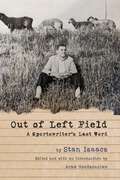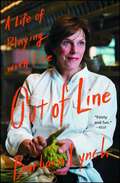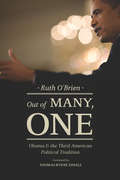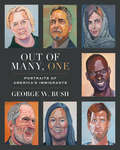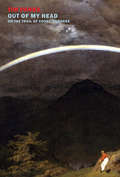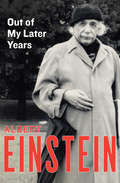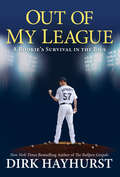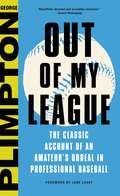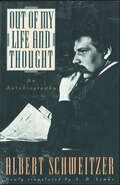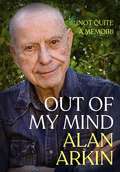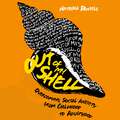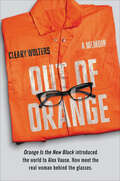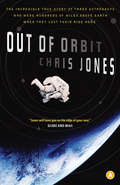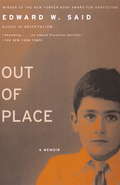- Table View
- List View
Out of Captivity: Surviving 1,967 Days in the Colombian Jungle
by Gary Brozek Marc Gonsalves Keith Stansell Tom HowesOn February 13, 2003, a plane carrying three American civilian contractors--Marc Gonsalves, Keith Stansell, and Tom Howes--crash-landed in the mountainous jungle of Colombia. Dazed and shaken, they emerged from the plane bloodied and injured as gunfire rained down around them. As of that moment they were prisoners of the FARC, a Colombian terrorist and Marxist rebel organization. In an instant they had become American captives in Colombia's volatile and ongoing conflict, which has lasted for almost fifty years. In Out of Captivity, Gonsalves, Stansell, and Howes recount for the first time their amazing tale of survival, friendship, and, ultimately, rescue, tracing their five and a half years as hostages of the FARC. Their story takes you inside one of the world's most notorious terrorist organizations, going behind enemy lines with vivid and haunting imagery. Their words conjure a reality that few people have ever encountered--from sleeping on beds literally carved out of the jungle to escaping Colombian military air strikes under the cover of darkness to being bound with steel chains by their captors. Describing backbreaking starvation marches and forced isolation, the authors chronicle their confrontations and interactions with the FARC guerrilla soldiers--a motley crew of brainwashed, idealistic teenagers and seasoned vet-erans who've been around long enough to realize that the only way out of the FARC is in a body bag. Though the physical punishments their bodies endured were unrelenting, the psychological battles they waged were the ultimate test of their resolve. With candid detail, Gonsalves, Stansell, and Howes relate the perilous mental struggles they each experienced, as they grappled with feelings of guilt, fear, and anxiety for the families and lives they'd left behind. Exposing the transformative power of captivity, they show how they turned these fears into strengths, using their memories and their families, their pasts and their futures, to motivate them in their quest for survival. Despite the odds and the conditions, despite the chains and the silence, and despite the often tense relationships they experienced with their fellow Colombian hostages, they had one another, forging a bond that allowed them to cope with the horrific conditions of their confinement. This brotherhood enabled them to persevere through the worst that the FARC threw at them while always reminding them of their ultimate goal: freedom. A harrowing account of one of the longest civilian hostage crises in United States history, Out of Captivity is a remarkable and compelling exploration of how far three Americans were willing to go as they fought to stay alive for themselves, their families, and one another.
Out of Control: How My Addiction Almost Killed Me
by Cathal Mccarron Christy O'ConnorCathal McCarron is a Tyrone footballer, talented enough to be nominated for an All-Star twice in the last three years. However, he hid a dark secret for years, a gambling addiction which almost destroyed him. While effectively on the run in London in 2013, his life had spiralled so viciously out of control that he ended up having sex with a man for a gay porn website. After getting paid, he walked across the road and gambled half his earnings in a betting shop. When footage subsequently leaked, McCarron could no longer hide his terrible secret, and keep running from his troubled past. He slowly began the long road back to rehabilitation. After a year out of the inter-county game with Tyrone in 2014, McCarron made a remarkable recovery in 2015, ending the season with an All-Star nomination. His story is a remarkable tale of the hidden demons that often visit and terrorise inter-county players. It also underlines the pressures and expectations so often taken for granted with amateur players. McCarron recalls his journey with searing honesty, from the depths of depression and to the edge of suicide to path taken back to recovery and rehabilitation. He is now studying to be a counsellor, aiming to help people rid themselves of the demons that once almost destroyed his life. The edge to the book is added with McCarron still an active inter-county player. His journey will also take you inside the dressing room of a team with serious ambitions of winning another All-Ireland title. McCarron's story is unlike any other written by a GAA player before.
Out of Darkness: Rumana Monzur's Journey through Betrayal, Tyranny and Abuse
by Denise ChongFrom the bestselling author of The Concubine&’s Children and The Girl in the Picture, a gripping story of a domestic assault that shocked the world, of the exercise of power and political influence, and of the Bangladeshi woman whose irrepressible spirit found light in sudden darkness.From the outside, Rumana seemed an unlikely victim of domestic abuse: married to a man of her own choosing and progressing in her career as a professor of international relations at Dhaka University. But in 2011, on return from graduate studies at the University of British Columbia, her husband attacked and blinded her in front of their young daughter. As Rumana's horrifying story garnered international headlines, and connections brought her to Vancouver in an attempt—ultimately futile—to restore her sight, her plight underscored the fact that there are no typical victims of intimate-partner violence. Denise Chong goes behind the headlines to reveal the devolution of a love story into a tale of tyranny behind closed doors, and the pursuit of justice that proved all the more elusive during the rise of social media. Out of Darkness tells a globe-spanning narrative of loyalty, perseverance and a woman&’s determination to face the future and rebuild a life with meaning.
Out of Darkness: The Jeff Healey Story
by Cindy Watson<P>Short-listed for the 2011 Golden Oak Award <P>From the moment three-year-old Jeff Healey first laid a guitar across his lap in what was to become his signature style, it was clear he was no ordinary kid. <P>Losing both eyes to retinoblastoma, a rare form of cancer, opened a door to another world for Jeff, a newly adopted infant. <P>Out of darkness he created music, becoming one of the most influential blues-rock and jazz performers of our time, beginning with his first hit album, See the Light. <P> In this up-close and personal account, loaded with never-before-seen photographs, memorabilia, and intimate recollections of family, friends, and fellow musicians, we discover this unique music icon’s dynamic career, which saw him collaborate with everyone from George Harrison and Eric Clapton to B.B. King and Stevie Ray Vaughan. <P>From Jeff’s lonely start one snowy night at St. Joseph’s Hospital in Toronto to his untimely end in the same building, we come away with a potent message of empowerment and a renewed sense of hope.
Out of Darkness: The Story of Louis Braille
by Russell FreedmanA biography of the 19th century Frenchman who developed Braille. The book spans Braille's life from childhood through his days at the Royal Institute for Blind Youth and into his final years, when the alphabet he invented was finally gaining acceptance.
Out of Dublin
by Ethel RohanOut of Dublin, a survivor’s captivating story of loss, abuse, and resilience, is a stunning short memoir told with startling honesty and vulnerability. Perhaps what’s most arresting about this work, above its unique voice, above its call to end silence, is the depth of its author’s capacity for compassion, love, and forgiveness.
Out of Gaza: A Tale of Love, Exile, and Friendship
by Dr. Katharina GalorOut of Gaza tells the story of Dima Mansour, a young Palestinian who suffers hardship growing up in Jordan and Gaza during the Gaza War of 2014, later escaping to be with the man she loves in Belgium, where she is held in a detention center for illegal immigrants. Her harrowing story is told by Katharina Galor, an Israeli Jewish scholar who forms a close and unexpected friendship with Mansour. Despite the profound asymmetry that defines the geopolitical context of their lives—one marked by Palestinian loss and exile, the other by Jewish trauma and persecution—their bond uncovers surprising parallels in their shared experiences of displacement and survival. As their friendship unfolds, Galor and Mansour come to intimately understand the lasting impact of ethnic cleansing from the Holocaust and the Nakba, and how these pivotal events have shaped their families, identities, and ties to the region. Out of Gaza delves into themes of identity, belonging, and the enduring effects of historical trauma, showing how empathy and resilience can bridge even the deepest divides.
Out of Harm's Way: The Wartime Evacuation Of Children From Britain
by Jessica MannIn June 1940 Britain expected enemy invasion. Despite Churchill's determination to fight on the beaches, many parents made desperate efforts to send their children abroad to safety. Thousands left for America, Canada, Australia and other distant countries.In this revealing new book, Jessica Mann, herself a wartime evacuee, looks at the experiences of those who were sent away to a foreign land including their dangerous journeys across U-boat-ridden oceans, and asks how they coped with being away, and also how they found life back in the UK on their return. Drawing on extensive original research and memories of many former evacuees, including Elizabeth Taylor and Shirley Williams, Jessica Mann builds up a moving portrait of a lost generation.
Out of Hiding: A Holocaust Survivor’s Journey to America (With a Foreword by Alan Gratz)
by Ruth GruenerRuth Gruener was a hidden child during the Holocaust. At the end of the war, she and her parents were overjoyed to be free. But their struggles as displaced people had just begun.In war-ravaged Europe, they waited for paperwork for a chance to come to America. Once they arrived in Brooklyn, they began to build a new life, but spoke little English. Ruth started at a new school and tried to make friends -- but continued to fight nightmares and flashbacks of her time during World War II.The family's perseverance is a classic story of the American dream, but also illustrates the difficulties that millions of immigrants face in the aftermath of trauma.This is a gripping and human account of a survivor's journey forward with timely connections to refugee and immigrant experiences worldwide today.
Out of India: An Anglo-Indian Childhood
by Jamila Gavin"I am truly a child of both countries and both cultures". Born to an Indian father and an English mother, Jamila Gavin's childhood was divided between two worlds. Her earliest memories are of India, where she lived in a crumbling palace built for a prince, and learned to steal sugar cane and suck mangoes. But she would spend much of her childhood in England, where she picked blackberries, got chilblains, and learned to recognise doodlebug bombs. And between the two there were unforgettable journeys, by bullock carts and tongas, crowded trains and romantic P&O liners. A touching and very personal recollection, with a backdrop of world-shaking events, from the Blitz of World War II to the struggle for Indian independence and the assassination of Gandhi.
Out of Left Field: A Sportswriter’s Last Word (Sport and Society)
by Stan Isaacs“My idol growing up, all I wanted to be, was Stan Isaacs.” --Tony Kornheiser “Stan Isaacs is directly responsible for my television career--and much of how I approached what I’ve said and whom I’ve said it about.” --Keith Olbermann Iconoclastic and irreverent, Stan Isaacs was part of a generation that bucked the sports establishment with a skepticism for authority, an appreciation for absurdity, and a gift for placing athletes and events within the context of their tumultuous times. Isaacs draws on his trademark wink-and-a-grin approach to tell the story of the long-ago Brooklyn that formed him and a career that placed him amidst the major sporting events of his era. Mixing reminiscences with column excerpts, Isaacs recalls antics like stealing a Brooklyn Dodgers pennant after the team moved to Los Angeles and his many writings on Paul Revere’s horse. But Isaacs also reveals the crusading and humanist instincts that gave Black athletes like Muhammad Ali a rare forum to express their views and celebrated the oddball, unsung Mets over the straitlaced Yankees. Insightful and hilarious, Out of Left Field is the long-awaited memoir of the influential sportswriter and his adventures in the era of Jim Brown, Arthur Ashe, and the Amazin’ Mets.
Out of Line: A Life of Playing with Fire
by Barbara Lynch&“If you have an appetite for culinary adventure, you&’ll devour the feisty and fun memoir&” (Elle magazine) by James Beard award-winning chef, restaurateur, and Top Chef judge Barbara Lynch as she recounts her rise from her rough &“Southie&” childhood to culinary stardom.Celebrated chef Barbara Lynch—named one of Time magazine's 100 Most Influential People in 2017—credits the defiant spirit of her upbringing in tough, poor &“Southie,&” a neighborhood ruled by the notorious Whitey Bulger gang, with helping her bluff her way into her first professional cooking jobs; develop a distinct culinary style through instinct and sheer moxie; then dare to found an empire of restaurants ranging from a casual but elegant &“clam shack&” to Boston&’s epitome of modern haute cuisine. As award-winning chef Ana Sortun raves, &“Her heroic story inspires us to remain true to who we are and honor our dreams with conviction.&” One of seven children born to an overworked single mother, Lynch was raised in a housing project. She earned a daredevil reputation for boosting vehicles (even a city bus), petty theft, drinking and doing drugs, and narrowly escaping arrest—haunted all the while by a painful buried trauma. Out of Line describes Lynch&’s remarkable process of self-invention, including her encounters with colorful characters of the food world, and vividly evokes the magic of creation in the kitchen. It is also a love letter to South Boston and its vanishing culture, governed by Irish Catholic mothers and its own code of honor. &“Foodies will enjoy the vivid language used to describe Lynch&’s food exploits, and old neighbors will be treated to a trip around south Boston through the eyes of a local&” (Library Journal). Through her story, Lynch explores how the past—both what we strive to escape from and what we remain true to—can strengthen and expand who we are.
Out of Many, One: Obama and the Third American Political Tradition
by Ruth O'BrienFeared by conservatives and embraced by liberals when he entered the White House, Barack Obama has since been battered by criticism from both sides. In "Out of Many, One," Ruth O Brien explains why. We are accustomed to seeing politicians supporting either a minimalist state characterized by unfettered capitalism and individual rights or a relatively strong welfare state and regulatory capitalism. Obama, O Brien argues, represents the values of a lesser-known third tradition in American political thought that defies the usual left-right categorization. Bearing traces of Baruch Spinoza, John Dewey, and Saul Alinsky, Obama s progressivism embraces the ideas of mutual reliance and collective responsibility, and adopts an interconnected view of the individual and the state. So, while Obama might emphasize difference, he rejects identity politics, which can create permanent minorities and diminish individual agency. Analyzing Obama s major legislative victories financial regulation, health care, and the stimulus package O Brien shows how they reflect a stakeholder society that neither regulates in the manner of the New Deal nor deregulates. Instead, Obama focuses on negotiated rule making and allows executive branch agencies to fill in the details when dealing with a deadlocked Congress. Similarly, his commitment to difference and his resistance to universal mandates underlies his reluctance to advocate for human rights as much as many on the Democratic left had hoped. By establishing Obama within the context of a much longer and broader political tradition, this book sheds critical light on both the political and philosophical underpinnings of his presidency and a fundamental shift in American political thought. "
Out of Many, One: Portraits of America's Immigrants
by George W. BushIn this powerful new collection of oil paintings and stories, President George W. Bush spotlights the inspiring journeys of America’s immigrants and the contributions they make to the life and prosperity of our nation. <P><P>The issue of immigration stirs intense emotions today, as it has throughout much of American history. But what gets lost in the debates about policy are the stories of immigrants themselves, the people who are drawn to America by its promise of economic opportunity and political and religious freedom—and who strengthen our nation in countless ways. <P><P>In the tradition of Portraits of Courage, President Bush’s #1 New York Times bestseller, Out of Many, One brings together forty-three full-color portraits of men and women who have immigrated to the United States, alongside stirring stories of the unique ways all of them are pursuing the American Dream. <P><P>Featuring men and women from thirty-five countries and nearly every region of the world, Out of Many, One shows how hard work, strong values, dreams, and determination know no borders or boundaries and how immigrants embody values that are often viewed as distinctly American: optimism and gratitude, a willingness to strive and to risk, a deep sense of patriotism, and a spirit of self-reliance that runs deep in our immigrant heritage. In these pages, we meet a North Korean refugee fighting for human rights, a Dallas-based CEO who crossed the Rio Grande from Mexico at age seventeen, and a NASA engineer who as a girl in Nigeria dreamed of coming to America, along with notable figures from business, the military, sports, and entertainment. <P><P>President Bush captures their faces and stories in striking detail, bringing depth to our understanding of who immigrants are, the challenges they face on their paths to citizenship, and the lessons they can teach us about our country’s character. As the stories unfold in this vibrant book, readers will gain a better appreciation for the humanity behind one of our most pressing policy issues and the countless ways in which America, through its tradition of welcoming newcomers, has been strengthened by those who have come here in search of a better life. <P><P><b>A New York Times Best Seller</b>
Out of My Head: On the Trail of Consciousness
by Tim ParksAdventures in cutting-edge ideas about consciousness, from bestselling non-fiction writer Tim Parks.Hardly a day goes by without some discussion about whether computers can be conscious, whether our universe is some kind of simulation, whether mind is a unique quality of human beings or spread out across the universe like butter on bread. Most philosophers believe that our experience is locked inside our skulls, an unreliable representation of a quite different reality outside. Colour, smell and sound, they tell us, occur only in our heads. Yet when neuroscientists look inside our brains to see what's going on, they find only billions of neurons exchanging electrical impulses and releasing chemical substances.Five years ago, in a chance conversation, Tim Parks came across a radical new theory of consciousness that undercut this interpretation. This set him off on a quest to discover more about this fascinating topic and also led him to observe his own experience with immense attention.Out of My Head tells the gripping, highly personal, often surprisingly funny, story of Tim Parks' quest to discover more about this fascinating topic. It frames complex metaphysical considerations and technical laboratory experiments in terms we can all understand. Above all, it invites us to see space, time, colour and smell, sounds and sensations in an entirely new way. The world will feel more real after reading it.
Out of My Later Years: The Scientist, Philosopher, and Man Portrayed Through His Own Words
by Albert EinsteinAn inspiring collection of essays, in which Albert Einstein addresses the topics that fascinated him as a scientist, philosopher, and humanitarian Divided by subject matter—&“Science,&” &“Convictions and Beliefs,&” &“Public Affairs,&” etc.—these essays consider everything from the need for a &“supranational&” governing body to control war in the atomic age to freedom in research and education to Jewish history and Zionism to explanations of the physics and scientific thought that brought Albert Einstein world recognition. Throughout, Einstein&’s clear, eloquent voice presents an idealist&’s vision and relays complex theories to the layperson. Einstein&’s essays share his philosophical beliefs, scientific reasoning, and hopes for a brighter future, and show how one of the greatest minds of all time fully engaged with the changing world around him. This authorized ebook features rare photos and never-before-seen documents from the Albert Einstein Archives at the Hebrew University of Jerusalem.
Out of My Later Years: The Scientist, Philosopher, and Man Portrayed Through His Own Words
by Albert EinsteinAn inspiring collection of essays, in which Albert Einstein addresses the topics that fascinated him as a scientist, philosopher, and humanitarian Divided by subject matter—&“Science,&” &“Convictions and Beliefs,&” &“Public Affairs,&” etc.—these essays consider everything from the need for a &“supranational&” governing body to control war in the atomic age to freedom in research and education to Jewish history and Zionism to explanations of the physics and scientific thought that brought Albert Einstein world recognition. Throughout, Einstein&’s clear, eloquent voice presents an idealist&’s vision and relays complex theories to the layperson. Einstein&’s essays share his philosophical beliefs, scientific reasoning, and hopes for a brighter future, and show how one of the greatest minds of all time fully engaged with the changing world around him. This authorized ebook features rare photos and never-before-seen documents from the Albert Einstein Archives at the Hebrew University of Jerusalem.
Out of My League: A Rookie's Survival in the Bigs
by Dirk HayhurstThe New York Times bestseller from the author of The Bullpen Gospels. &“A humorous, candid and insightful memoir . . . Grade: Home Run.&”—Cleveland Plain Dealer After six years in the minors, pitcher Dirk Hayhurst hopes 2008 is the year he breaks into the big leagues. But every time Dirk looks up, the bases are loaded with challenges—a wedding balancing on a blind hope, a family in chaos, and paychecks that beg Dirk to ask, &“How long can I afford to keep doing this?&” Then it finally happens—Dirk gets called up to the Majors, to play for the San Diego Padres. A dream comes true when he takes the mound against the San Francisco Giants, kicking off forty insane days and nights in the Bigs. Like the classic games of baseball&’s history, Out of My League entertains from the first pitch to the last out, capturing the gritty realities of playing on the big stage, the comedy and camaraderie in the dugouts and locker rooms, and the hard-fought, personal journeys that drive our love of America&’s favorite pastime. &“A rare gem of a baseball book.&”—Tom Verducci, Sports Illustrated &“Observant, insightful, human, and hilarious.&”—Bob Costas &“A fun read . . . This book shows why baseball is so often used as a metaphor for life.&”—Keith Olbermann &“Entertaining and engaging . . . reminiscent of Jim Bouton&’s Ball Four.&”—Booklist &“The book is a terrific read. If you loved Bullpen Gospels (I&’d have a hard time believing you are a baseball fan if you didn&’t) you will love Out of My League too.&”—Bluebird Banter
Out of My League: The Classic Hilarious Account of an Amateur's Ordeal in Professional Baseball
by Jane Leavy George PlimptonThe baseball classic that Ernest Hemingway called "beautifully observed and incredibly conceived," now repackaged and including a foreword from Jane Leavy and photographs from the Plimpton archives.The first of Plimpton's remarkable forays into participatory journalism, OUT OF MY LEAGUE chronicles with wit, charm, and grace what happens when a self-professed amateur has the chance to answer every fan's question: could he strike out a major league star? Plimpton's inspired idea--to get on the mound and pitch a few innings to the All-Stars of the American and National Leagues--begins as a fun-filled stunt and comes to a deeply hellish, nearly humiliating end. This honest and hilarious tale features Mickey Mantle, Willie Mays, Whitey Ford, Ralph Houk, and other baseball greats and is "a baseball book such as no one else ever wrote, and one of the best ever." --New York Herald Tribune
Out of My Life and Thought: An Autobiography
by Albert SchweitzerPublished to commemorate Albert Schweitzer's only visit to the United States 60 years ago, this anniversary edition of his autobiography gives 21st-century readers a unique and authoritative account of the man John F. Kennedy called "one of the transcendent moral influences of our century."Schweitzer is celebrated around the world as a European pioneer of medical service in Africa, a groundbreaking philosopher and musical scholar, and a catalyst of environmental and peace activism. Yet people most revere Schweitzer for his dedication to serving others and his profound and influential ethic of reverence for life. For Schweitzer, reverence for life was not a theory or a philosophy but a discovery—a recognition that the capacity to experience and act on a reverence for all life is a fundamental part of human nature, a characteristic that sets human beings apart from the rest of the natural world.This anniversary edition coincides with several high profile celebrations of his 1949 visit, as well as the release of a new feature film starring Jeroen Krabbe and Barbara Hershey. In addition to a foreword by Nobel Laureate and former U.S. President Jimmy Carter, this edition features a new foreword by Lachlan Forrow, president of The Albert Schweitzer Fellowship.--This text refers to the Paperback edition.
Out of My Mind: (Not Quite a Memoir)
by Alan ArkinAlan Arkin, one of the most beloved and accomplished actors of our time, reveals a side of himself not often shown on stage or screen. Like many teenagers, 16-year-old Alan Arkin had it all figured out. Then came young adulthood, and with it a wave of doubt so strong it caused him to question everything he thought he knew about himself and the world. Ever skeptical and full of questions, Arkin embarked on a spiritual journey to find something—anything—to believe in. An existential crisis in his 30s led him to the study of Eastern philosophy. Soon he began opening himself to the possibility that there was more to life than what he had simply seen, heard, or been taught. In this "mini-memoir," the 84-year-old actor shares his powerful spiritual experiences, from his brush with reincarnation to the benefits of meditation. In a gruff, earthy voice that sounds more suited to a New York cabbie than a spiritual guide, he shows us that wisdom can come from the most unexpected places and teachers. Out of My Mind is a candid, relatable, and delightfully irreverent take on how one man went searching for meaning and ended up discovering himself.
Out of My Shell: Overcoming Social Anxiety from Childhood to Adulthood
by Natasha DanielsLook around you at all the people connecting and socializing. And you are just standing here alone, like a social reject, again. Nobody likes you. Why would they want someone like you around?For years, social anxiety whispered its way into Natasha Daniels' mind and quietly sabotaged her life. Even while working as a therapist, helping children to cope with their own anxiety, insecurity lurked in the shadows pointing out the stares, the rejection, the vicious comments from online strangers.In this memoir, Natasha takes on the therapist's role with her past selves to drag her social anxiety into the open. From feisty Miss 6, lonely Miss 14 reeling from a tumultuous childhood, and defiant Miss 18 pushing back against a world where she didn't fit, through to her present self, Natasha explores the way social anxiety colored her experiences and finds healing through self-acceptance.
Out of Orange: A Memoir
by Cleary WoltersThe real-life Alex from Netflix’s Orange Is the New Black tells her own story in this memoir of crime, punishment, and her relationship with Piper.When Cleary Wolters first saw a commercial for the TV show Orange is the New Black, she knew her life would never be the same. After a blur of words and images alluding to lesbian lovers, drug smuggling, and life behind bars, Cleary saw a character wearing her signature black-rimmed glasses. In that moment, she knew that her private past had been brought to light in the most public way imaginable.Based on Piper Kerman’s sensational memoir, Orange is the New Black tells the story of a privileged white woman who spent thirteen months in prison for her involvement in an international drug-smuggling ring. On the show, Alex Vause is Piper’s antagonist/love interest who seduced her into a life of crime. Now, pseaking out for the first time, Cleary sets the record straight on the show, life in prison, and much more . . . In Out of Orange, Cleary tells a brutally honest, emotional tale of the bold decisions and epic mistakes she made—and the struggle to keep them from defining the rest of her life.
Out of Orbit: The True Story of How Three Astronauts Found Themselves Hundreds of Miles Above the Earth With No Way Home
by Chris JonesIn February 2003, American astronauts Donald Pettit and Kenneth Bowersox and Russian flight engineer Nikolai Budarin were on a routine fourteen-week mission maintaining the International Space Station. But then the space shuttle Columbia exploded far beneath them. With the launch program suspended indefinitely, these astronauts had suddenly lost their ride back to earth. Out of Orbit chronicles the efforts of the beleaguered mission controls in Houston and Moscow as they worked frantically against the clock, ultimately settling on a plan that felt, at best, like a long shot. Latched to the side of the space station was a Russian-built Soyuz TMA-1 capsule, the rocket equivalent of a 1976 Gremlin. Despite the inherent danger, the Soyuz became the only hope to return Bowersox, Budarin, and Pettit home. Their harrowing journey back to earth is a powerful reminder that space travel remains an incredibly dangerous pursuit.
Out of Place: A Memoir
by Edward W. SaidWINNER OF THE NEW YORKER BOOK AWARD FOR NONFICTION • From one of the most important intellectuals of our time comes an extraordinary story of exile and a celebration of an irrecoverable past. A fatal medical diagnosis in 1991 convinced Edward Said that he should leave a record of where he was born and spent his childhood, and so with this memoir he rediscovers the lost Arab world of his early years in Palestine, Lebanon, and Egypt."Engrossing. . . . [Said has] an almost Proustian feel for smells, sounds, sights, and telling anecdotes." --The New York Review of Books Said writes with great passion and wit about his family and his friends from his birthplace in Jerusalem, schools in Cairo, and summers in the mountains above Beirut, to boarding school and college in the United States, revealing an unimaginable world of rich, colorful characters and exotic eastern landscapes. Underscoring all is the confusion of identity the young Said experienced as he came to terms with the dissonance of being an American citizen, a Christian and a Palestinian, and, ultimately, an outsider. Richly detailed, moving, often profound, Out of Place depicts a young man's coming of age and the genesis of a great modern thinker.
